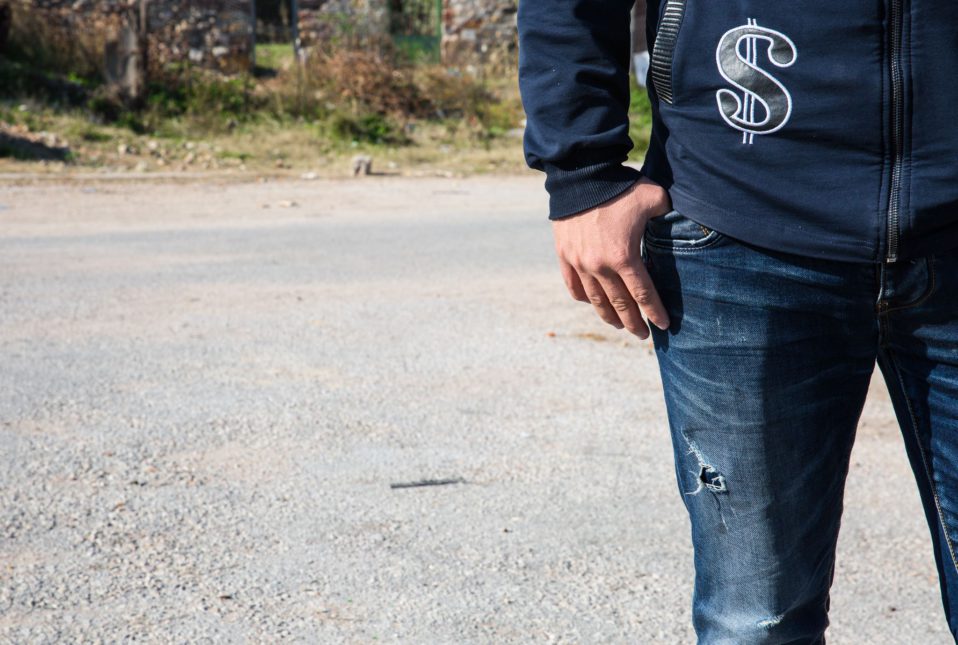Følg med i Dråpen i Havets adventskalender fra Chios, som lar dere bli kjent med 24 flotte og modige mennesker fra flyktningleiren vi jobber i. Med denne kalenderen ønsker vi å gi dere et innblikk i hvem menneskene på flukt er, og hver dag presenteres en ny person. Alle historiene presenteres på engelsk.
December 10th: Mahmoud
Written by Jamie Janson and photos by Nickie Mariager-Lam
The Refugee Camp Archipelago
Mahmoud has politely accepted our invitation to be interviewed in a small cafe a few minutes walk from his tent in Souda Camp, thus crossing a boundary he usually prefers to avoid.
For the island of Chios has two realities: one is the normal, relaxed life of a picturesque, off-season Greek island, whose inhabitants are free to hop on a ferry or plane at any time to somewhere more interesting.
The other is a grey, dystopian zone of razor wire, tents flapping in the wind and portacabins decked in EU acronyms: one corner of Europe’s new refugee camp archipelago. Time moves differently once you enter this world, the occupants are weighed down by pocketfuls of official paperwork, as if trapped in one of those nightmares where you can’t escape a tormentor.
Mahmoud crossed into this world nearly three weeks ago, crammed into a small boat with 43 other hopeful people. He is a gentle-mannered 19 years old from Algeria, with a ready smile as he politely struggles to follow the schoolboy French of his interviewers. He flicks through his previous life on Facebook with us. With a pale complexion, brown hair and a close cropped beard, he could be from anywhere in Europe, the poses and selfies with friends on his phone no different from those of countless other teenagers on this continent. The earliest is a picture of him and his twin brother as toddlers, dressed in matching blue dungarees.

The photos reveal that his main passion is football. Back home he used to play every day and he coached for his home city’s football team. He is a dedicated Barcelona fan.
Mahmoud left school at 15 and started working at a fast food restaurant to help support his family. Unfortunately his father suffered a back injury at work and Mahmoud’s wages were not enough to support the family. He needed to find a better paying job, and an uncle working as a car mechanic in France seemed to provide an opportunity. But an Algerian looking for options outside his country finds doors slammed in his face at every turn. Three times he attempted to get a visa to France, without success. His choices were now either a perilous three-day journey across the Mediterranean or a 45-minute dash across the Aegean.
With savings given to him by his mother, Mahmoud took a flight to Istanbul, then travelled to the port of Izmir. His Facebook posts from that time state he is feeling sad he has left home, but calm that his journey has begun.
It took a month to arrange the crossing to Greece. In contrast to many others in Souda Camp, Mahmoud says he suffered no hostility or abuse in Turkey. The worst hardship was waiting in the primitive accommodation provided by the people smugglers, whilst awaiting his turn to make the crossing. Crammed twelve to a room, he had to sleep on a bare floor, with no blanket provided. His restaurant skills came in handy however as he became the group’s cook during their wait.
The first three attempts to make it to Chios ended with the Turkish Coastguard firing warning shots in the air to force their boat to turn back. Each time he was detained, photographed and fingerprinted. On the fourth attempt they made it across the border to Chios.
Now he shares a tent with three other young Algerians, a Tunisian and a Moroccan. They would all like to get to Germany. Mahmoud´s dream is still to reach Paris. How is he coping with life in Souda Camp?
He gives a thumbs up, although his hand wavers a little. He arrived a couple of days after the recent far-right arson attack on the camp, and some people have resorted to drinking at night to cope with the stress and frustration of their prolonged detention.
This leads to frequent fights. Emotions can flash through the camp like a weather system, the weary patience of the dinner queue shattered by a sudden flare up of tempers, frayed by the months of enforced idleness, and the relentless bureaucracy of Europe’s hospitality. Overall, however, the conditions don’t seem to have affected his genial nature yet.
We finish our interview and walk back over that invisible line to the camp. With his fair skin, Mahmoud would be indistinguishable from any other European tourist visiting Chios. But there is the weight of that official paperwork he carries around, a web of EU policy acronyms that constrains his body language, and makes him feel uncomfortable walking around the town.
Whatever status is finally granted him by the authorities, he is a young human being who wants the chance to work hard, play his favourite sport and have a family, just like any other. The sad irony is that Europe has an ageing population and needs exactly the kind of energy and enthusiasm people like Mahmoud can bring to a society.
The only possible threat he could be is to the opposing teams he would face on the football pitch.


Post a comment